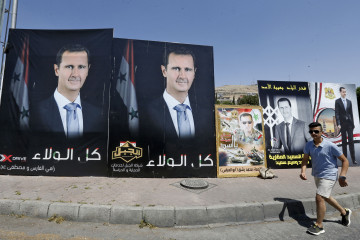

In what some observers have described as a diplomatic breakthrough for the Syrian regime, Amman hosted a four-way meeting for energy ministers on 8 September in a bid to resolve Lebanon’s endemic energy crisis.
The ministerial meeting was attended by Jordan’s Minister of Energy and Mineral Resources Hala Zawati, Egyptian Minister of Petroleum and Mineral Resources Tarek El Molla, Syrian Minister of Oil and Mineral Resources Bassam Tohme, and Lebanese Minister of Energy and Water, Raymond Ghajar.
This was the first time since the Syrian uprising in 2011 that a Syrian minister was invited to a high-level regional meeting.
"Jordan and Egypt share the view that it is important to bring Iraq and Syria back to the Arab fold"
The ministers approved a proposal to supply Egyptian natural gas to Lebanon via an existing gas pipeline that extends from northern Sinai, through Jordan and Syria to Tripoli in Lebanon. They also agreed that Jordan would supply electricity through Syria to Lebanon at a later stage.
On 12 September, Tohme was quoted by SANA news agency as saying that the Arab gas pipeline in the Syrian territory is ready to operate and that Syria will take a share of the gas according to agreements with other parties involved and that gas will be used to generate electricity.
He added that the pipeline had undergone maintenance after it was damaged by “terrorists”. The pipeline was operational between 2009 and 2012.
The proposal was first made by the United States through its ambassador in Lebanon, Dorothy Shea, on 19 August, which was announced by the Lebanese presidency. But The New Arab has learned that the idea was first suggested by Jordan’s King Abdullah during his visit to Washington last July.
The king urged the Biden administration to join a task force to initiate a dialogue with the Syrian regime. He told CNN that the regime is staying and that President Bashar al-Assad has longevity and the US and Europe should focus on changing the behaviour of the regime rather than regime change.
The fact that Egypt and Jordan support the initiative indicates that they received a green light from Washington. The New Arab has also learned that both countries were assured by the White House that the administration can provide a waiver from sanctions under the Caesar Act for certain dealings with Syria.
|
|
King Abdullah discussed his ideas about resolving the Syrian crisis with President Vladimir Putin when he visited Moscow on 23 August. The US adoption of the Jordanian proposal came in reaction to an announcement by Hezbollah chief Hassan Nasrallah on 14 August that Iran was ready to send oil tankers to help Lebanon deal with its energy crisis.
In reaction to the US proposal, a high-level official Lebanese delegation visited Damascus on 4 September for the first time since 2011 to ask Syria for its support. The Syrian regime was quick to back the proposal.
Amman hopes that resolving the Lebanese energy crisis could pave the way for regional and international engagement with the Syrian regime. It hopes that such engagement, with Russian backing, would distance Damascus from Iran; a move that is supported by Syria’s neighbours and may facilitate Syria’s return to the Arab League.
"Jordan hopes that engagement with the Syrian regime would distance Damascus from Iran"
At the same time, delivering gas and electricity to Lebanon would derail Hezbollah’s plans to make Lebanon more dependent on Iran. Lebanon could face sanctions under the Caesar Act if it deals with Iran.
For Jordan, in particular, normalisation with Syria would revive trade with Lebanon and Syria and enable Jordanian companies to participate in reconstruction efforts in the future.
A political process that could end the Syrian crisis would also potentially allow more than a million Syrian refugees in Jordan to return to their homeland.
Jordan and Egypt share the view that it is important to bring Iraq and Syria back to the Arab fold. The two countries have formed an economic bloc with Iraq under what Iraqi Prime Minister Mustafa al-Kadhimi called “a new Levant”, and he left the door open for Syria to join in the future.
Washington supports this new bloc, which aims at distancing Baghdad from Tehran, among other things.
Jordanian political analyst Amer Al Sabayleh told The New Arab that the Amman meeting is a gateway for political normalisation with Syria.
“The meeting breaks political taboos in terms of dealing with Syria and the energy collaboration is a step in that direction,” he said. “But that is only one step and for this project to succeed you need stability inside Syria and the political will to re-engage and make concessions.”
Energy expert Hashem Akel told The New Arab that the project will benefit all parties, particularly energy-starved Lebanon.
“Lebanon will get gas and electricity while Jordan and Syria will charge passage fees and the World Bank will finance the cost of Egyptian gas,” he said.
“In the long run, I can see a regional power grid that will benefit Syria, Lebanon, Jordan and Iraq and will bring the cost of electricity down”.
Osama Al Sharif is a journalist and political commentator based in Amman.
Follow him on Twitter: @plato010





 Follow the Middle East's top stories in English at The New Arab on Google News
Follow the Middle East's top stories in English at The New Arab on Google News


